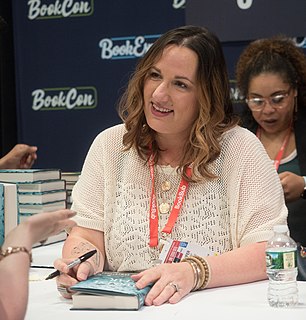A Quote by Nick Harkaway
I wrote the first draft of 'Tigerman' while my wife was pregnant - needless to say, I was relaxed and casual about her well-being during this tender time - and the novel clearly has its center in that panicked parental desperation that accompanies a first child and in the admittedly comedic extremes to which it drives us.
Related Quotes
It's more like I write multiple first drafts, handwritten. So with my first novel, I wrote whole drafts from different points of view. There are different versions of that novel in a drawer on loose-leaf sheets. I won't even look at the first draft while I'm writing the second, and I won't look at the second before writing the third.
I was a lot dumber when I was writing the novel. I felt like worse of a writer because I wrote many of the short stories in one sitting or over maybe three days, and they didn't change that much. There weren't many, many drafts. That made me feel semi-brilliant and part of a magical process. Writing the novel wasn't like that. I would come home every day from my office and say, "Well, I still really like the story, I just wish it was better written." At that point, I didn't realize I was writing a first draft. And the first draft was the hardest part.
His desperation and misery swept her up like a storm capturing the sea. She turned her mind to even these feelings, because they were his, like his terrified rage in the lift when they had first met, being wrapped in his arms in the cold well, being dazzled by his wonder at the woods and her home and her. Like being a child, awareness of him the morning chorus that woke her and the lullaby that sent her to sleep, his thoughts always her first and last song.I love you, Kami told him, and cut.
My wife is my first reader, my first line of defence I suppose. So she says, "Oh well, oh yes, it's all true." At the same time, I could have written much more about us, but I didn't want to go any further. I did cut things out. There are certain things that I wrote about her that are so gushing with praise and admiration that when I looked at those passages I realised they would be ridiculous to anybody else.
Almost all good writing begins with terrible first efforts. You need to start somewhere. Start by getting something-anything-down on paper. A friend of mine says that the first draft is the down draft-you just get it down. The second draft is the up draft-you fix it up. You try to say what you have to say more accurately. And the third draft is the dental draft, where you check every tooth, to see if it's loose or cramped or decayed, or even, God help us, healthy.
I am a technophile, so there is no such thing as a first draft. The first draft plunges on, and about a quarter of the way through it I realise I'm doing things wrong, so I start rewriting it. What you call the first draft becomes rather like a caterpillar; it is progressing fairly slowly, but there is movement up and down its whole length, the whole story is being changed. I call this draft zero, telling myself how the story is supposed to go.
With Ibrahim al-Koni, what I figured out was - and you'll see this in his novels - if your time is limited, make the unit of the chapters small so that you can finish one a day, at least in the first draft. Once you have the first draft it's living, and you can coax it to grow and trim it and reshape it and so on. But get that first draft. I think if I'd gone to an MFA program and learned that, it would have been money well spent. But translation has been that for me.
I finished my first novel - it was around 300 pages long - when I was 16. Wrote one more before I got out of high school, then wrote the first Lincoln Perry novel when I was 19. It didn't sell, but I liked the character and I knew the world so I tried what was, in my mind, a sequel. Wrote that when I was 20, and that one made it.







































